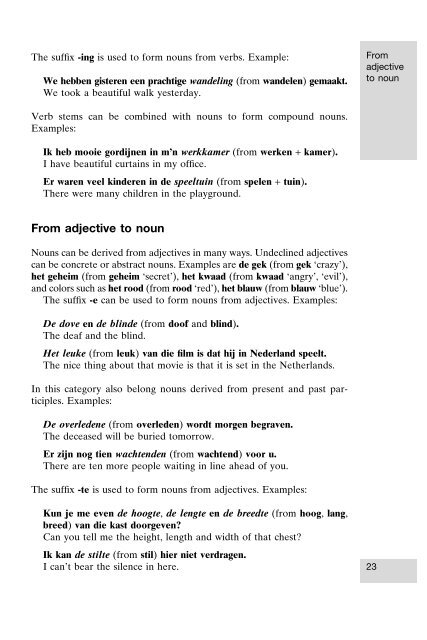er - Home
er - Home
er - Home
You also want an ePaper? Increase the reach of your titles
YUMPU automatically turns print PDFs into web optimized ePapers that Google loves.
The suffix -ing is used to form nouns from v<strong>er</strong>bs. Example:<br />
We hebben gist<strong>er</strong>en een prachtige wandeling (from wandelen) gemaakt.<br />
We took a beautiful walk yest<strong>er</strong>day.<br />
V<strong>er</strong>b stems can be combined with nouns to form compound nouns.<br />
Examples:<br />
Ik heb mooie gordijnen in m’n w<strong>er</strong>kkam<strong>er</strong> (from w<strong>er</strong>ken + kam<strong>er</strong>).<br />
I have beautiful curtains in my office.<br />
Er waren veel kind<strong>er</strong>en in de speeltuin (from spelen + tuin).<br />
Th<strong>er</strong>e w<strong>er</strong>e many children in the playground.<br />
From adjective to noun<br />
Nouns can be d<strong>er</strong>ived from adjectives in many ways. Undeclined adjectives<br />
can be concrete or abstract nouns. Examples are de gek (from gek ‘crazy’),<br />
het geheim (from geheim ‘secret’), het kwaad (from kwaad ‘angry’, ‘evil’),<br />
and colors such as het rood (from rood ‘red’), het blauw (from blauw ‘blue’).<br />
The suffix -e can be used to form nouns from adjectives. Examples:<br />
De dove en de blinde (from doof and blind).<br />
The deaf and the blind.<br />
Het leuke (from leuk) van die film is dat hij in Ned<strong>er</strong>land speelt.<br />
The nice thing about that movie is that it is set in the Neth<strong>er</strong>lands.<br />
In this category also belong nouns d<strong>er</strong>ived from present and past participles.<br />
Examples:<br />
De ov<strong>er</strong>ledene (from ov<strong>er</strong>leden) wordt morgen begraven.<br />
The deceased will be buried tomorrow.<br />
Er zijn nog tien wachtenden (from wachtend) voor u.<br />
Th<strong>er</strong>e are ten more people waiting in line ahead of you.<br />
The suffix -te is used to form nouns from adjectives. Examples:<br />
Kun je me even de hoogte, de lengte en de breedte (from hoog, lang,<br />
breed) van die kast doorgeven?<br />
Can you tell me the height, length and width of that chest?<br />
Ik kan de stilte (from stil) hi<strong>er</strong> niet v<strong>er</strong>dragen.<br />
I can’t bear the silence in h<strong>er</strong>e.<br />
From<br />
adjective<br />
to noun<br />
23


